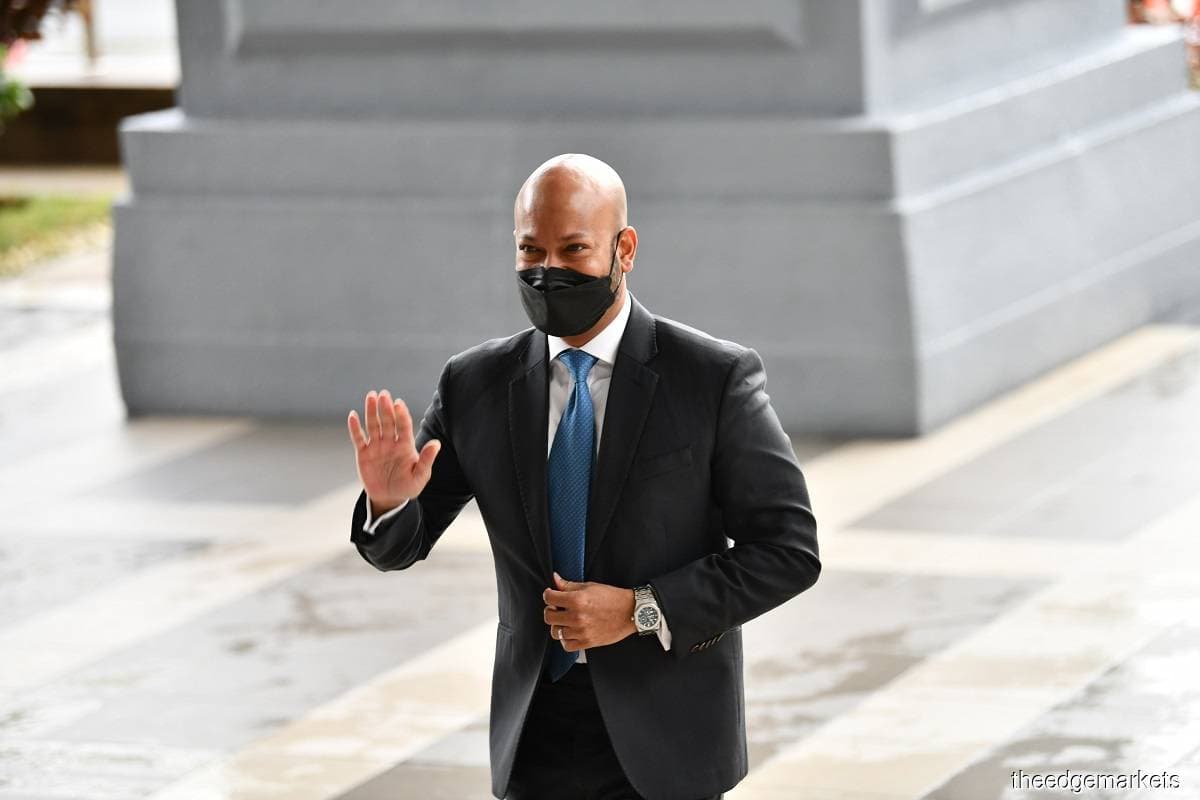
KUALA LUMPUR (June 24): Former 1Malaysia Development Bhd (1MDB) president and chief executive officer (CEO) Arul Kanda Kandasamy will be a prosecution witness in the ongoing 1MDB audit report tampering trial, High Court Judge Justice Mohamed Zaini Mazlan ruled.
In delivering his decision on Friday (June 24), Justice Zaini said that he was satisfied with the prosecution's grounds that Arul Kanda as the then CEO had relevant information on the charge against former prime minister Datuk Seri Najib Razak.
"The fact that he was the CEO and attended the meetings on Feb 24 and 25, [2016] is relevant to the charge against Najib," the judge said.
Arul Kanda and Najib are the two accused in the trial.
Indemnity
On the issue of indemnity, Justice Zaini said that it is up to the court to determine if Arul Kanda had indeed made a "true and full discovery".
"There should not be any danger of him testifying to minimise his role as the fear should be directed towards ensuring that he tells the truth, Otherwise, he loses the privilege of getting a certificate of indemnity," he said.
The judge added that as long as the witness tells the truth, it does not matter whether Arul Kanda's testimony supports the prosecution or the defence's case.
During submissions on June 14, Arul Kanda's lawyer Datuk N Sivananthan raised some practical issues to be considered primarily — when his client will be given indemnity and what would his status be should he be called to testify.
Addressing this, Justice Zaini said that the matter of indemnity would be considered at the end of the prosecution's case.
"Whether Arul Kanda has given a true and full discovery cannot be determined in isolation. The court must consider the testimonies of all the prosecution's witnesses vis-a-vis Arul Kanda's testimony and the documents that have been tendered as exhibits to determine his testimony's veracity," the judge said.
After Arul Kanda has finished his testimony, he will sit in the public gallery until the judge decides on the issue of indemnity.
Sivananthan also clarified that he is now holding a watching brief as he is no longer a defence counsel on the matter.
Application to call Arul Kanda
Justice Zaini also ruled on Friday that it is up to the prosecution to make the application to call Arul Kanda as a witness at any stage of the trial.
"There is no hindrance for the prosecution to make the application at this stage or at any stage of the trial — for it is entirely in their hands to conduct the prosecution in any manner they deem fit," he said.
In his judgement, Justice Zaini also highlighted Najib's counsel Tan Sri Muhammad Shafee Abdullah's preliminary objection raised during submissions on June 14.
The senior counsel argued that the prosecution's application lacked precise details that the prosecution was seeking from Arul Kanda and should have been made through a notice of motion supported by an affidavit.
On Friday, Justice Zaini said that Section 63 of the Malaysian Anti-Corruption Commission (MACC) Act 2009 does not specify that the application must be made through a notice of motion.
"It would have been stated so expressly had that been the requirement," said the judge.
He added that an application under Section 63 is to give the court and defence counsel notice of the prosecution's intention, and that was apparent in this case as the prosecution had made that clear from the onset of the case that they may call upon Arul Kanda to testify.
Justice Zaini also pointed out to Shafee that Section 63 confers discretionary power on the court as the section "clearly states" that the court "may" grant the prosecution's application.
Following the ruling on Friday, Arul Kanda was called to the witness stand and the trial proceeded with his testimony.
The prosecution made a formal application to call Arul Kanda as a witness to testify against Najib on May 20. Sri Ram said the application, which was made under Section 63 of the MACC Act 2009, was sanctioned by Attorney General Tan Sri Idrus Harun.
Section 63 states that whenever two or more persons are charged with an offence, the court may, on an application in writing by the public prosecutor, require one or more of them to give evidence as a witness or witnesses for the prosecution.
In the trial, Najib is charged with abuse of power as a public officer in his capacity as the then prime minister and finance minister in altering the 1MDB audit report which was to be tabled to the Public Accounts Committee in 2016. This was so that no action could be taken against him by Parliament. Arul Kanda is charged with abetting Najib.
Read also:
Najib concerned 1MDB audit report would be 'spun politically' to his detriment, says Arul Kanda
Lawyer: Arul Kanda still co-accused in 1MDB audit tapering trial, should have never been charged
Arul Kanda will stand by his MACC witness testimony, says lawyer
1MDB audit report tampering trial: Prosecution applies to call Arul Kanda as witness to testify against Najib